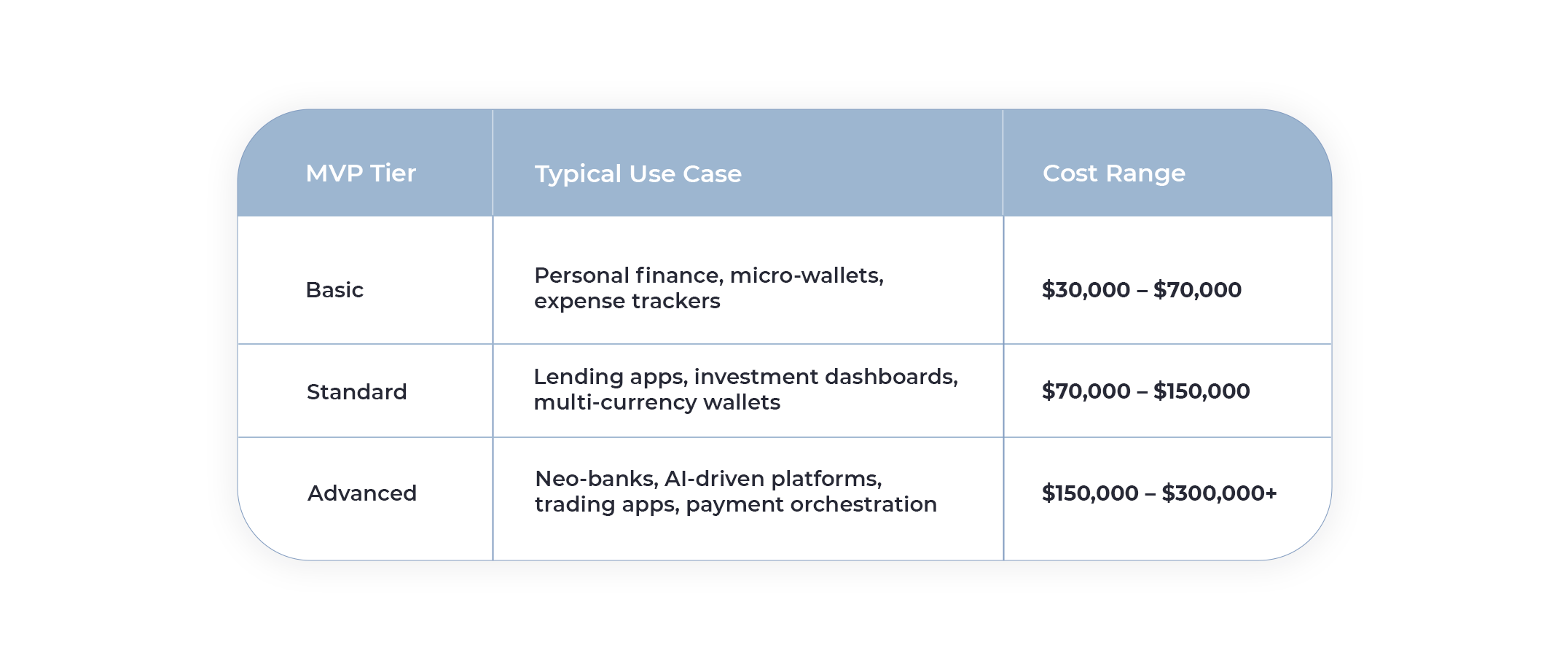
(And what founders learned about budgeting smarter)
2025 has been a defining year for fintech. Between regulatory tightening, new AI-driven compliance tools, and the flood of digital-banking startups, one question dominated founder Slack channels and investor meetings alike: How much did it really cost to build a fintech MVP this year?
If you’ve been watching budgets fluctuate and wondering what separates teams that scaled fast from those that stalled mid-build — this article breaks it all down.
We’ve analyzed 2025’s most cited data from fintech development consultancies and real-world founder feedback.
Here’s what the numbers (and the lessons) say.
The Real Cost of Building a Fintech MVP in 2025
By the end of 2025, cost brackets stabilized into three main tiers depending on complexity, compliance needs, and tech stack maturity:

💡 Observation: Costs didn’t rise dramatically in 2025 — but compliance, data-security, and design complexity made “mid-tier” projects drift closer to six figures than in previous years.
In 2025, investors rewarded speed-to-market with compliance readiness. Startups that invested early in regulatory tech (KYC/AML automation, PCI-DSS certification, etc.) reduced audit friction later — even if it meant higher upfront MVP cost.
Teams that tried to “skip” those layers paid more by Q3 when tightening rules hit digital-payment platforms across the EU and North America.
Simple financial tracking? Cheap. Real-time payments, instant currency conversion, or AI-driven insights? Expect costs to multiply.
The fintech MVPs that succeeded in 2025 kept their first version razor-focused on a single, validated transaction flow.
Regulatory overhead dominated the year. GDPR, PSD3 drafts, and new KYC APIs all demanded security-first builds. Fintech teams typically spent 15–25% of total dev budget purely on compliance infrastructure.
The most cost-efficient MVPs came from hybrid teams: architects in Western Europe or the U.S. paired with delivery teams in Ukraine, Poland, and India — reducing hourly rates without compromising fintech expertise.
Cross-platform frameworks (Flutter, React Native) surged among seed-stage founders. Those using native stacks saw higher cost but smoother performance in regulated markets.
Cloud providers (AWS, GCP, Azure) remained dominant, but localized compliance hosting emerged as a major budget variable.
▪ Licensing & API fees – especially for payment rails or data aggregators like Plaid or Finicity.
▪ Security audits & pen tests – mandatory for investor readiness.
▪ UX writing and onboarding flow optimization – critical for conversion, often underestimated.
▪ Post-launch upkeep – teams reported maintenance at 20–30% of build cost annually.
1. “Lean” didn’t mean “cheap.” The best MVPs were those that did one thing with compliance-grade quality.
2. Budget flexibility saved launches. Over-allocation (by 10–15%) was common wisdom by mid-year to handle API or regulatory surprises.
3. AI integration raised expectations. Projects that embedded intelligent fraud detection or analytics early saw investor interest skyrocket.
4. Design made trust tangible. Clean UI and transparent onboarding became a compliance signal in itself.
As fintech edges into a new cycle, two things will define MVP cost efficiency:
▪ Automation in compliance — expect AI tools to handle KYC/AML at scale.
▪ Reusable fintech backbones — more founders will build on modular, API-first infrastructures instead of custom cores.
That means by early 2026, MVP timelines could shorten by up to 25%, even as standards rise.
2025 proved that fintech success doesn’t come from cutting corners — it comes from building credibility first. If your MVP checks the boxes of trust, security, and usability, funding and users follow faster than you expect.
So, how much did it cost to build a fintech MVP in 2025? Anywhere from $30K to $300K, but the real differentiator wasn’t the number — it was what that money protected, automated, and proved.
If you’re planning a 2026 fintech launch, get a detailed MVP cost audit before you start development. We’ll benchmark your idea against 2025’s data, identify savings opportunities, and map a compliance-ready roadmap.
👉 Book a free MVP cost assessment
Or send your feature list to get a custom breakdown within 48 hours.